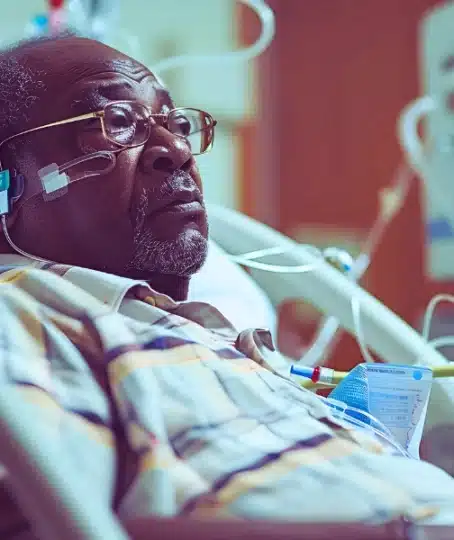Peoria Kidney Dialysis Errors Lawyer
Were You Injured Because of Kidney Dialysis Malpractice?
Over 516,000 American patients are receiving dialysis treatments for End-Stage Renal Disease (ESRD) or kidney failure. Kidney dialysis is a lifeline for these patients, acting as an artificial kidney. When dialysis errors happen, the consequences can be severe, or even deadly.
If mistakes in dialysis treatment caused you or a loved one to suffer injuries, you need to take legal action now. A dialysis malpractice lawsuit can provide you with the financial relief you need to cover your medical bills, lost wages, and other losses.
At Strong Law Offices, our kidney dialysis errors lawyers in Peoria hold negligent healthcare providers accountable for the injuries they cause. Let us help you secure maximum compensation.
Why Trust Strong Law to Handle Your Dialysis Malpractice Case?
Our firm has a reputation for providing top-notch legal services to injured victims in Illinois. We have recovered hundreds of millions on behalf of our clients.
- FreeConsultation
- Over 25 Yearsof Experience
- No FeeUnless You Win
Call Strong Law Offices today. Your consultation is
free, and there are no fees unless we win your
case.

What You Need to Know About Kidney Dialysis and Malpractice in Illinois
Dialysis is a medical treatment that filters waste, excess fluid, and harmful chemicals from the blood when the patient’s kidneys no longer can. Patients with a wide range of medical conditions may need dialysis, including, but not limited to, those with:
- End-Stage Renal Disease
- Lupus
- Diabetes
- High blood pressure
About 90% of patients with kidney failure or ESRD receive hemodialysis, which involves cleaning the patient’s blood outside the body. For those who receive peritoneal dialysis, blood is filtered inside the body using the abdomen lining. In Illinois, the majority of these procedures are done in dialysis centers and hospitals. Sometimes, they are performed at nursing homes and in private residences, however.
How Is Negligence in Dialysis Treatment Happening?
In 2003, the United States General Accounting Office (GAO) revealed that many dialysis centers had not been meeting the standard of care expected of them. The GAO reported that a significant number of patients were not receiving proper treatment for anemia, and they were receiving inadequate dialysis. Additionally, such serious deficiencies existed that patient lives were at risk. These included things like lack of physician involvement in patient care, contaminated water supplies used in dialysis, and frequent medication errors.
Even with today’s technology, many of these problems continue to exist in dialysis centers in Chicago and throughout the U.S. Alarmingly, they are accompanied by additional issues that put patients’ lives at risk.
Common types of negligence that harm dialysis patents include:
- Non-sterile conditions
- Medication errors
- Improper catheter placement
- Failure to monitor the patient’s blood work
- Misuse of dialysis machines
- Incorrect use of acid concentrate in hemodialysis machines
- Dialysate solutions mistakes
- Inadequate cleaning and filtering of dialysis machines
- Failure to monitor the patient’s vital signs
If negligence occurred during any phase of your kidney dialysis treatment, and you were severely injured, you have a legal right to compensation. To win a claim against the negligent medical provider, though, you’re going to need a law firm with the determination, skill, and resources to stand up for your rights. You need Strong Law Offices.
Call Now. 309-393-2928
In the Spotlight: Corruption in the Dialysis Industry
There is corruption in the dialysis industry, and patients with kidney failure need to know about the risks before they too fall victim to dialysis malpractice.
Although The Anti-Kickback Statute (AKS) prohibits medical professionals from receiving kickbacks for referrals, patients in 2025 still aren’t routinely told when their providers are incentivized to steer them toward certain dialysis centers, products, or services.
Additionally, The Stark Law prohibits physician self-referral for designated health services if they have a financial relationship with the entity. However, some nephrologists in the United States own all or part of the dialysis clinics they refer patients to. While this is legal, these ownership stakes pose financial conflicts of interest, since the doctors earn both treatment fees and a share of clinic profits. Despite this, physicians seldom disclose these ownership arrangements to their patients.
Why are these arrangements at issue?
Dialysis is a multi-billion dollar industry in the United States. Sadly, some doctors and dialysis clinics are putting profits ahead of patient safety. Physicians, large corporations, and investors like Warren Buffett are making money off of patients who are referred to for-profit treatment facilities, while dialysis patients pay the price.
In Illinois, over 26,000 patients every year depend on kidney dialysis to stay alive, and most receive treatment in for-profit facilities. In 2022, the ESRD state summary reported that 2,353 dialysis patients in Illinois died. There were 6,560 new dialysis patients in our state that year.
Across the United States:
- Approximately 87% of people on dialysis are receiving treatment at a for-profit center.
- Patients receiving care at for-profit facilities are 64% less likely to be placed on the deceased donor waiting list.
- These patients are also 48% less likely to receive a kidney from a living donor, and
- Roughly 56% less likely to receive a kidney from a deceased donor.
These people are often not told about all their treatment options, or referred for transplants that could add years to their lives. Sadly, profit incentives are a primary reason why.
When healthcare professionals fail to inform patients about the treatments available to them, and instead push their patients to stay in dialysis indefinitely, the result isn’t just unethical—it can be grounds for legal action.
Patients have the right to informed consent and unbiased medical advice. When physicians or dialysis clinics conceal financial relationships, fail to disclose all available treatment options, or pressure patients into specific therapies for personal gain, they may be violating medical ethics, patient rights, and in some cases, state or federal law.
At Strong Law Offices, we stand up for dialysis patients who’ve been misled, mistreated, or injured by a system that too often puts profits ahead of people. If you were harmed by a dialysis provider’s negligence or conflict of interest, our attorneys can help you uncover the truth and hold the responsible parties accountable.
The dialysis industry may be big business—but you’re not powerless. With the right legal team, you can fight back.
Kidney Dialysis Injuries Caused by Medical Negligence
When doctors, nurses, or dialysis clinic staff fail to follow proper protocols, kidney dialysis errors and oversights can lead to serious complications, such as deadly sepsis infections, blood clots, internal bleeding, and cardiac arrest. In some cases, negligent care during dialysis can be fatal.
Many of these injuries are entirely avoidable when healthcare professionals follow established safety standards. Despite the dangers, understaffed facilities, inadequate training, and profit-driven corporate dialysis providers continue to put patients at risk.
Common serious and life-threatening injuries caused by negligent kidney dialysis treatment include:
- Sepsis and bloodstream infections due to unsanitary equipment or improper catheter use
- Cardiac complications, including arrhythmias, low blood pressure, or heart attacks during treatment
- Excessive blood loss from needle dislodgement, improperly inserted catheters, or anticoagulant errors
- Head injuries, fractures, or internal trauma from falls when patients are left unmonitored during or after dialysis
- Hemolytic anemia, which may occur when chlorinated or contaminated water enters the bloodstream
- Nerve damage resulting from prolonged low blood pressure or improper needle placement
- Electrolyte imbalances that can cause confusion, muscle weakness, or heart rhythm issues
- Air embolism, a potentially fatal condition caused by air entering the bloodstream through dialysis lines
- Hypotension or shock, triggered by rapid fluid removal or poor patient monitoring
- Wrong-site or wrong-patient procedures, including use of incorrect dialyzers or medication
- Death, often preventable with proper monitoring and adherence to dialysis safety standards
Why Should You File a Lawsuit for Kidney Dialysis Errors?
Hiring an experienced attorney and filing a medical malpractice lawsuit for injuries caused by kidney dialysis errors ensures that you have the financial relief you need to cover your lost wages, medical bills, future medical treatments, and other losses. Recovering compensation isn’t the only benefit to taking legal action, however.
Taking legal action holds negligent healthcare providers accountable for substandard care. It sends a clear message that preventable errors—like contaminated equipment, poor monitoring, or improper procedures—will not be tolerated. Your case could help prompt changes in safety protocols and prevent others from suffering similar harm.
Filing a lawsuit can also provide a sense of justice, closure, and validation for what you and your family have endured. But time is limited.
In Illinois, strict deadlines apply to medical malpractice claims. If you wait too long, you may lose your right to seek compensation altogether.
Call 309-393-2928 Now for Strong Law Offices
Do You Need to Hire a Kidney Dialysis Malpractice Lawyer?
Dialysis malpractice cases require experienced attorneys with specific knowledge of kidney disease treatment and the complex medical issues involved. At Strong Law Offices, our legal team understands the medical terminology, treatment protocols, and industry standards that govern dialysis care.
Establishing medical negligence in dialysis injury cases requires demonstrating that healthcare providers failed to meet the accepted standard of care. This involves showing that a competent medical professional in similar circumstances would have acted differently. Our Peoria dialysis malpractice attorneys work with medical experts who specialize in nephrology and dialysis treatment to analyze medical records, review treatment protocols, and identify deviations from proper care standards.
We thoroughly investigate all aspects of the dialysis treatment, including staff training records, equipment maintenance logs, and facility protocols. Documentation of vital signs, fluid removal rates, and patient responses during treatment becomes crucial evidence in these cases. Our legal team also examines whether proper informed consent was obtained and whether patients were adequately warned about potential risks and complications.
How Much Does It Cost to Hire a Lawyer for a Kidney Dialysis Errors Case?
At Strong Law Offices, we recognize that dialysis patients and their families are dealing with serious health challenges and financial pressures. Our attorneys work on a contingency fee basis, meaning you pay no attorney fees unless we recover compensation for your case. We handle all aspects of the legal process while you focus on your health and recovery, providing compassionate support throughout this difficult time.

